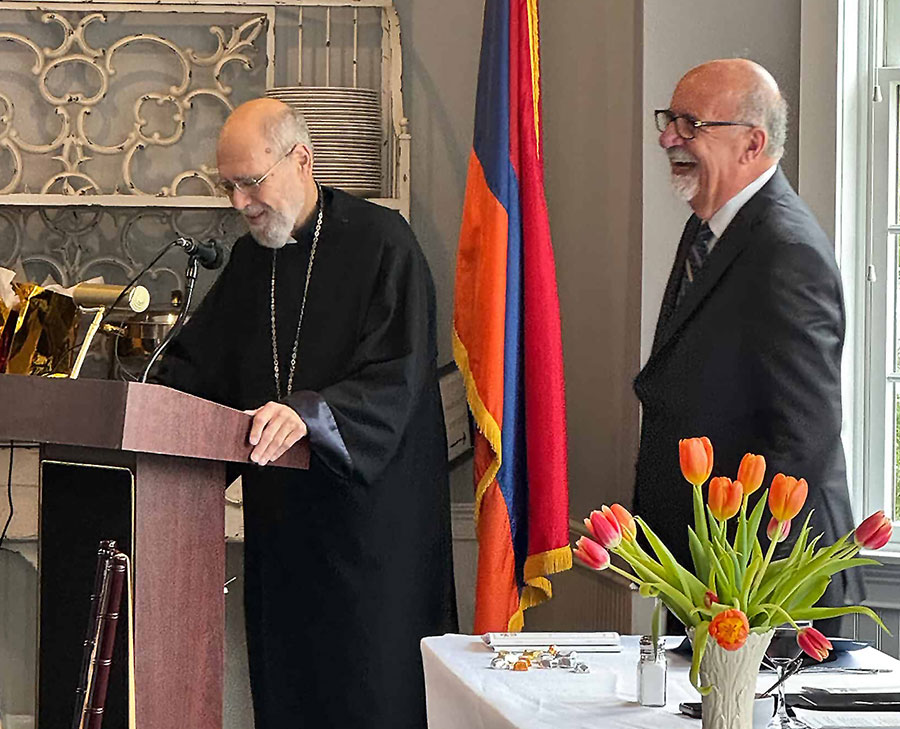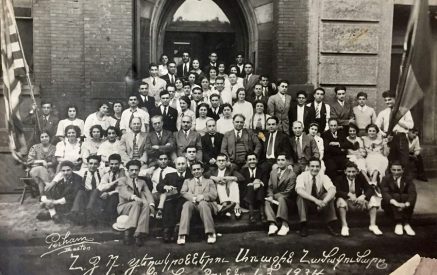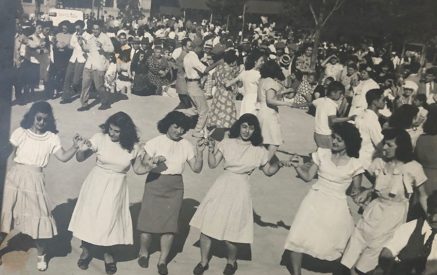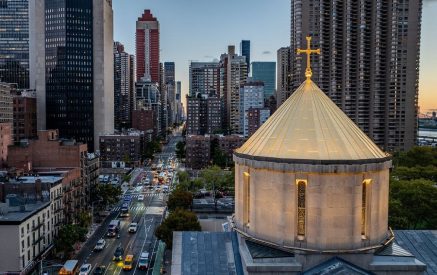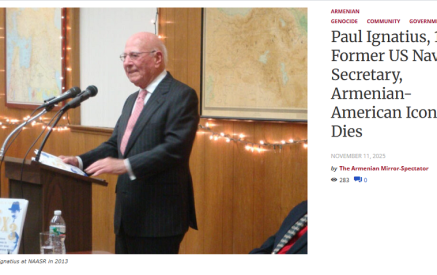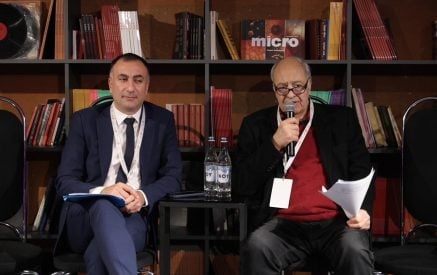by Stepan Piligian
In many ways, our lives on earth are analogous to the chapters of a book. Each phase of our journey is unique but connected to the whole, just as each chapter adds to the complete story. Our youthful years begin with total dependence on our parents. We slowly mature into semi-independence, just as the robin feeds her young in the nest only to watch them leave. The role of parenting prepares us for the independence of our offspring. Each of us prepares for the cycle of life as roles evolve.
Our priests in the Armenian community are unique in their profession but not exempt from the transitions of life’s journey. They have a special vocation, based on a calling to serve our Lord and bring the faithful closer to our Lord and savior Jesus Christ. This has been accomplished according to the canons and traditions of our beautiful Armenian Apostolic Church since our patron Saint Gregory. The holy ordination of our priests empowers them to serve in a special capacity by bringing the blessings of the sacraments to the congregants. Only a priest can celebrate the Soorp Badarak that offers the sacrifice, the body and blood of our savior to participants. Our priests are leaders, advisors, confidants and mediators. They are also the target of unfair criticism, gossip and emotional outbursts. It is a difficult job to be on the receiving end of human frailty. Most of our priests carry on with dignity and perseverance, based on a love of God and a resulting love of others. They understand the meaning of forgiveness and are trained to lead diverse groups. We all have our recollections of the successes and failures of priestly tenures, but none of this can tarnish the beauty of the vocation. God has a plan for all of us if we are listening. Our priests at some point in their lives answered His call.
Read also
I have always felt comfortable around the clergy. Our parents were deeply immersed in the life of the church in a variety of capacities. As deacon of our parish, our father spent considerable time with our parish priests, visiting clergy and our Prelacy bishops. My memory is filled with warm recollections of a number of clergy who visited our home. Although initially a bit intimidating, it established a comfort level and respect that have driven my life as an adult. As a young tbir (acolyte), I felt nervous around our Prelate Archbishop Hrant Khatchadourian. In my teens and later, I established a warm and important relationship with him.
During the mid-1970’s, the Indian Orchard St. Gregory parish received the exciting news from the Prelacy that a young priestly candidate would be ordained in our parish and begin his ministry there. This young man, just a few years older than me, would be the first American born priest to serve the eastern Prelacy. He was born and raised in the Worcester Armenian community and after attending Assumption College decided to pursue his seminary studies at the renowned complex in Antelias. The community experienced a surge of energy in preparation for this unprecedented event.
Little did I know what a profound impact his ministry would have on my life. Dad was not only deacon but also chairman of the board of trustees and was an early leader in the formation of the Prelacy. As such, many of the planning details were reviewed at our kitchen table or during phone conversations. It was an exciting time, as we all learned the traditions and protocol of a priestly ordination. There was a new meaning to the term “karasoonk.” While it was generally believed to be a requiem after 40 days for departed souls, we were enlightened to learn that it is also the 40 days spent in spiritual solitude and isolation by a newly-ordained priest. It was 1976, and the candidate was Nishan Baljian. His wife, also from Worcester, is Cheryl (Arpineh) Depoian Baljian, who was blessed with incredibly dedicated Armenian Christian parents. The ordination was a stunning event filled with the richest of our rituals and traditions. The new priest was renamed (as is the tradition with priestly ordinations) Antranig. With this ordination, Der Antranig and Yeretzgin joined the community, and our families began what has become an eternal bond.
My father became a mentor for Der Antranig, and through their endearing relationship, I established a brotherly relationship with Der Hayr. I will be forever grateful for the counsel and advice offered by Der Hayr and Yeretzgin during those early days at St. Gregory. It was a steadying influence on my developing life. I soon found that Der Hayr and I shared an affinity for satirical comedy. Der Hayr ran Bible studies in our parish, at a time when there were precious few offered. Our parish, under his leadership, hosted some groundbreaking spiritual retreats that I vividly recall to this day. For the year-end hantes of our adult Armenian language class, Der Hayr and I wrote a comedy entitled “Entanragan Hevantanots” (General Hospital), which was a satire on community life. I can still hear the endless multi-generation laughter from the church community. Der Antranig advocated for young girls to serve on the altar, and his courage and vision afforded that opportunity to many. Yeretzgin Cheryl was a trailblazer in her own right, helping to advance the role of priests’ wives beyond traditional methods. Her leadership in this domain inspired many during times when there were fewer voices.
Perhaps the greatest impact Der Antranig has had in our relationship has been his guidance in my spiritual growth. Similar to many of you, I have always been an adherent to our church but had not yet made an emotional heartfelt connection with Jesus Christ through our church. There are many who say that this association can be difficult to establish in a church where ethnicity and religious programming may compete. Our ancestors never felt that challenge, and neither does Der Antranig. He helped his parishes understand that the increase of our faith is the great enabler for all things, including our heritage. If the most important purpose of a priest’s ministry is to bring the faithful into a relationship with our Lord and savior for the purpose of our salvation, then Der Antranig has had a remarkable ride as a parish priest. He is my friend and someone I can discuss important issues with as my spiritual mentor. Through his Bible studies and informal conversations, I now also have a deeper understanding of the Badarak. That understanding has transformed my thinking from, “Why do we go to church?” to Badarak becoming an essential part of my life. We moved to the Boston area in 1992, and Der Hayr was assigned to St. Stephen’s in 1994, but time and distance will never diminish the impact that Der Hayr and the entire Baljian/Depoian family have had on my personal journey. I will always be grateful.
Der Antranig will retire officially in June from parish ministry, but as we all know, an Armenian priest never “retires.” Parish priests in our church become an intimate part of the community they serve. They baptize the children, mentor the youth and console families in times of need. These emotional bonds are stronger than employment status. Just as Der Antranig is revered in the Indian Orchard community, he will continue to serve the faithful of greater Boston in a different capacity. Sometimes just being present is a form of service. I remember how the renowned Der Arnak Kasparian of blessed memory from New Jersey used to refer to himself with humility as a “spare tire.” Both his humor and dedication were well known, as he continued to help where needed long after his parish ministry ended.
Der Antranig has a beautiful family that we have all watched grow up and take their place as community leaders. Both children were raised in the Indian Orchard community. Nayiri and Der Stephan still refer to me as “Uncle Stepan.” Yeretzgin and Der Hayr will have more well-deserved time to spend with their beautiful grandchildren. We often underestimate the familial impact of being a parish priest. We hear jokes about priests only working on Sundays, but nothing could be further from the truth. There are no hours for a parish priest. How many vacations are postponed or adjusted due to community commitments? How many parenting events are missed because of community responsibilities? It is quite common for priests to work every day, ministering to the needs of a large community. It can be exhausting for the family as well as the clergy. Cheryl is a retired educator who has managed parenting, grandparenting, a home life, her professional career as well as her role as the wife of a parish priest. Having watched her for many years, I know she has made significant contributions to modernizing the role of Yeretzgins in our society.
A few weeks ago, the parish that Der Antranig served in his youth held its 90th anniversary celebration. Der Hayr attended with Yeretzgin and members of their family.
It was emotional and ironic that Der Hayr addressed his former community during the program on the eve of his retirement. The circle of his parish ministry was complete. We all pray that God grants this humble servant a long and fruitful retirement, as his service to God moves on to the next chapter. Please take a moment to thank God for such humble servants as Der Antranig Baljian as he transitions from 48 years of parish ministry to the next chapter of his life. God bless you.



















































